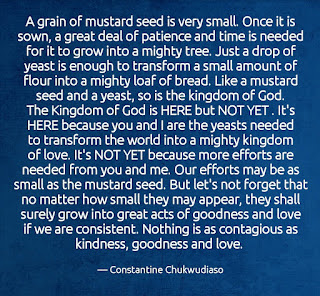Submission for Exaltation (Saturday, Week 30, Year 2)

Next Monday is All Souls Day: a day set aside in the Christian calendar for special remembrance of all souls. It is a day that brings back certain memories that may momentarily put us in a sorrowful mood. As usual, such occasions, such memories should help us ask ourselves one more time what death is to us. How do we perceive death? I am sure a lot of us (if not all of us) will say that death is our greatest enemy. Is death actually what we think of it? Is it actually the last sleep? Is it actually the total end of our existence? Instead of thinking of death as an enemy, I see it as an expected friend: a friend who opens up the entrance unto eternity. Instead of thinking of death as the last sleep, I see it as the final awakening. Instead of seeing death as the total end of my existence, I see it as a passage to my new and everlasting existence. At death, the light of time and earthly existence is turned off and then the dawn of eternity takes over. And that is why St Paul in today’s f...






















